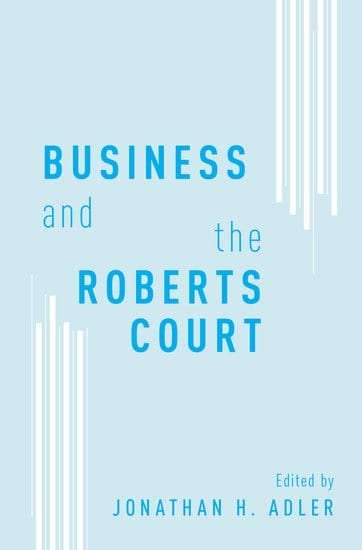Bussiness
Business and the Roberts Court Revisited

The Roberts Court has long been described as a “pro-business” court. News reports summarizing John Roberts’ first term as Chief Justice described the Court as business friendly. A New York Times Magazine profile was simply labeled “Supreme Court, Inc.” Activist groups tallied the win-loss record of the Chamber of Commerce, and academics published quantitative assessments purporting to show that the Supreme Court under Chief Justice Roberts was more sympathetic to business interests than any Court in decades.
I have been skeptical of the “pro-business” label as a useful description of the Court from the outset. Quantitative assessments of the Court’s decision-making have their place, but qualitative assessments of the Court’s decisions is necessary to evaluate the extent to which the Court’s decisions are benefitting or assisting business interests. Further, insofar as business groups tend to win in some sorts of cases but not others, it is more useful to describe the Court’s jurisprudence with more nuance and precision. A simply hashtag label is not that informative.

My 2016 book, Business and the Roberts Court sought to take a deeper look into the Court’s handling of business-related cases. In this volume, subject-matter experts looked at different aspects of the Court’s jurisprudence. Was the conclusion that the Court is “pro-business”? Here is how I summarized the findings:
Where business interests seek outcomes that are in line with the justices’ doctrinal commitments, they can expect to prevail. Yet where business interests are unable to marshal arguments that appeal to the justices’ underlying judicial philosophies, their odds are less favorable, no matter how much business groups may believe is at stake. So rather than say this is a Court that is “pro-business,” it is more accurate to say that this is a Court that business likes — except when it doesn’t.
Since then, the debate over whether to characterize the Court as pro-business has continued. In 2022, for instance, Lee Epstein and Mitu Gulati published an analysis of the Supreme Court’s treatment of business cases between 1920 and 2020.
Earlier this semester, I presented a new paper revisiting the question whether the Supreme Court is properly characterized as “pro-business” and offering a preliminary assessment on the extent to which Donald Trump’s appointment to the Court have made the Court more (or less) business-friendly. The paper is part of a symposium to be published in The Annals of the American Association of Political and Social Science. Here is the abstract:
The Roberts Court has long been characterized as a pro-business court, perhaps the most pro-business court in a century. Insofar as this alleged pro-business orientation is due to the Court’s Republican-appointed majority, President Trump’s appointments to the Supreme Court should have magnified the Court’s pro-business orientation. Yet there are reasons to question the general characterization of the Court as “pro-business” as well as the assumption that an increase in the Court’s Republican-appointed majority has increased any probusiness orientation. Quantitative analyses often fail to account for the relative importance of individual decisions, the broader, legal context in which the Court’s decisions are made, or how the Court’s decisions alter or depart from pre-existing legal baselines. While President Trump’s appointments to the Court have fairly consistently voted to restrain the power of administrative agencies, they have not consistently supported outcomes that are beneficial to business. In some areas in particular, such as cases involving state laws that may fragment or burden national markets, the Roberts Court may actually be less sympathetic to business interests than it was prior to Trump’s appointments to the Court.
On the one hand, the Roberts Court has become more skeptical of agency power and the administrative state. Thus insofar as one considers “pro-business” to mean “anti-regulatory,” one may conclude that the Court has become more solicitous of business concerns since Justices Gorsuch, Kavanaugh, and Barrett replaced Justices Scalia, Kennedy, and Ginsburg.
On the other hand, the Court appears to have become more skeptical of business arguments in favor of federal preemption of state regulations, whether under preemption doctrine of the Dormant Commerce Clause (think of cases such Virginia Uranium and National Pork Producers Council), while simultaneously becoming less solicitous of business arguments seeking to limit state court jurisdiction in tort suits (see, e.g., Mallory). This shift is particularly interesting as it appears to mark a shift in the Court’s jurisprudence—and a shift that is due, in part, to Trump’s appointments, Justice Gorsuch in particular.
While any assessment of the affect of Trump’s appointments to the Court is necessarily preliminary, I believe these shifts underscore the point that it is more helpful to think about the doctrinal commitments of the justices than to focus on broad characterizations such as “pro” or “anti” business. So, for example, one might characterize the Court’s emerging jurisprudence as one that is skeptical or hostile to federal regulation, but solicitous of state law. Insofar as this is a fair characterization, it would highlight how the Court looks favorably on business concerns in some areas (such as where business groups challenge federal regulatory agencies), but is unsympathetic in others (such as where business groups seek to constrain state authority). And whether these tendencies are good or bad is a separate question entirely.









:max_bytes(150000):strip_icc()/is-nordstrom-best-new-year-deals-social-c2d75f0278d6412db1feb1a224a5d0ec.jpg)